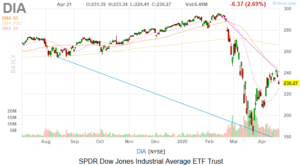Stocks stumbled again Tuesday as the ongoing decline in the oil pitch, coupled with fears a new coronavirus stimulus package will prove inadequate in bolstering the economy, served confirmation that a recession is setting in.
Source: Provided by Finviz
- The S&P 500 lost 3.07%
- The Dow Jones Industrial Average declined 2.67%
- The Nasdaq Composite gave up 3.48%
- Once again, oil names were surprisingly not the worst-performing Dow stocks today. That title goes to Merck (NYSE:MRK).
As noted yesterday, the energy sector is losing its pull on major domestic equity benchmarks, but in the case of the current oil environment, weight for a few energy stocks doesn’t matter. Demand, or lack thereof, does. Even looking as far out as the June contract for West Texas Intermediate (WTI), traders are seeing prices as low as $12 per barrel.
While the likes of Exxon (NYSE:XOM) and Chevron Corporation (NYSE:CVX) are losing cache within equity indexes, the real issue is low prices. Not only do low prices indicate demand is all but gone for oil, they indicate producers large and small will encounter difficulty turning profits.
Additionally, let me address the school of thought that low oil prices are good for the economy. If you get too low on the price chart, recession fears mount.
That’s exactly where markets are today, and it’s unsurprising that as a result, 30 of 30 Dow stocks were lower in late trading.
Same Old Song For IBM
IBM (NYSE:IBM) was a Dow offender today after the company reported disappointing first-quarter results. The tech company earned $1.84 a share on revenue of $17.57 billion. Analysts expected earnings of $1.79 a share on sales of $17.62 billion.
To be fair, there was positive commentary on the cloud business, but this is yet another quarter in which IBM earnings rose but revenue disappointed. It’s easy to explain this scenario: IBM is a voracious buyer of its own stock
More Earnings Malaise
Consumer staples names have been steady this year, but Coca-Cola (NYSE:KO) may not be the Covid-19 shelter play investors are hoping it would be. In its first-quarter earnings report, the soft drink giant said January and February were great months, but things got rocky in March and sales are declining in April.
As such, Coca-Cola pulled its guidance for the rest of 2020 while making comments about the current quarter that weren’t inspiring.
“The ultimate impact on the second quarter and full year 2020 is unknown at this time, as it will depend heavily on the duration of social distancing and shelter-in-place mandates, as well as the substance and pace of macroeconomic recovery,” according to the company. “However, the impact to the second quarter will be material.”
Piling On
Yesterday, I noted that analysts are starting to downgrade Disney (NYSE:DIS), though none are calling the name a “sell” quite yet. The stock traded lower again today after Citi Research analyst Jason Bazinet became at least the third analyst to trim a rating on Disney stock in recent days.
Bazinet highlighted the strength of Disney’s balance sheet and noted the dividend is probably safe, but he still took an ax to his earnings estimates on the name, going to $2.91 a share this year, down from $5.57, and to $5.18 for 2021, down from $6.14.
Bottom Line on the Dow Jones Today
Heading into this earnings season, it was obvious the news was going to be mostly bad. But if a supposedly boring, steady company such as Coca-Cola is yanking guidance, that’s a sign markets could be in for some more turbulence at the hands of the novel coronvirus.
The problem is earnings and economic data will drive near-term returns and there’s little in the way of good news to be had on either front.
“While coronavirus-related headlines will continue to impact the daily movements of the stock market, the longer-term trend will be driven by earnings and the economy,” according to Morningstar. “Investors are not only looking to analyze the depths of earnings deterioration in the near term, but more importantly they are evaluating the time frames for an economic recovery and an earnings rebound toward normalized levels.”
Todd Shriber has been an InvestorPlace contributor since 2014. As of this writing, he did not hold a position in any of the aforementioned securities.
